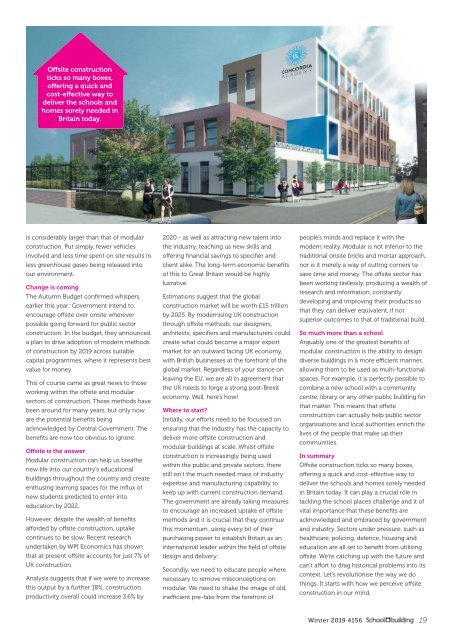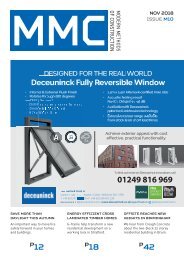SB 4156 32pp WEB
Create successful ePaper yourself
Turn your PDF publications into a flip-book with our unique Google optimized e-Paper software.
Offsite construction<br />
ticks so many boxes,<br />
offering a quick and<br />
cost-effective way to<br />
deliver the schools and<br />
homes sorely needed in<br />
Britain today.<br />
is considerably larger than that of modular<br />
construction. Put simply, fewer vehicles<br />
involved and less time spent on site results in<br />
less greenhouse gases being released into<br />
our environment.<br />
Change is coming<br />
The Autumn Budget confirmed whispers<br />
earlier this year; Government intend to<br />
encourage offsite over onsite wherever<br />
possible going forward for public sector<br />
construction. In the budget, they announced<br />
a plan to drive adoption of modern methods<br />
of construction by 2019 across suitable<br />
capital programmes, where it represents best<br />
value for money.<br />
This of course came as great news to those<br />
working within the offsite and modular<br />
sectors of construction. These methods have<br />
been around for many years, but only now<br />
are the potential benefits being<br />
acknowledged by Central Government. The<br />
benefits are now too obvious to ignore.<br />
Offsite is the answer<br />
Modular construction can help us breathe<br />
new life into our country’s educational<br />
buildings throughout the country and create<br />
enthusing learning spaces for the influx of<br />
new students predicted to enter into<br />
education by 2022.<br />
However, despite the wealth of benefits<br />
afforded by offsite construction, uptake<br />
continues to be slow. Recent research<br />
undertaken by WPI Economics has shown<br />
that at present offsite accounts for just 7% of<br />
UK construction.<br />
Analysis suggests that if we were to increase<br />
this output by a further 18%, construction<br />
productivity overall could increase 3.6% by<br />
2020 - as well as attracting new talent into<br />
the industry, teaching us new skills and<br />
offering financial savings to specifier and<br />
client alike. The long-term economic benefits<br />
of this to Great Britain would be highly<br />
lucrative.<br />
Estimations suggest that the global<br />
construction market will be worth £15 trillion<br />
by 2025. By modernising UK construction<br />
through offsite methods, our designers,<br />
architects, specifiers and manufacturers could<br />
create what could become a major export<br />
market for an outward facing UK economy,<br />
with British businesses at the forefront of the<br />
global market. Regardless of your stance on<br />
leaving the EU, we are all in agreement that<br />
the UK needs to forge a strong post-Brexit<br />
economy. Well, here’s how!<br />
Where to start?<br />
Initially, our efforts need to be focussed on<br />
ensuring that the industry has the capacity to<br />
deliver more offsite construction and<br />
modular buildings at scale. Whilst offsite<br />
construction is increasingly being used<br />
within the public and private sectors, there<br />
still isn’t the much needed mass of industry<br />
expertise and manufacturing capability to<br />
keep up with current construction demand.<br />
The government are already taking measures<br />
to encourage an increased uptake of offsite<br />
methods and it is crucial that they continue<br />
this momentum, using every bit of their<br />
purchasing power to establish Britain as an<br />
international leader within the field of offsite<br />
design and delivery.<br />
Secondly, we need to educate people where<br />
necessary to remove misconceptions on<br />
modular. We need to shake the image of old,<br />
inefficient pre-fabs from the forefront of<br />
people’s minds and replace it with the<br />
modern reality. Modular is not inferior to the<br />
traditional onsite bricks and mortar approach,<br />
nor is it merely a way of cutting corners to<br />
save time and money. The offsite sector has<br />
been working tirelessly, producing a wealth of<br />
research and information, constantly<br />
developing and improving their products so<br />
that they can deliver equivalent, if not<br />
superior outcomes to that of traditional build.<br />
So much more than a school<br />
Arguably one of the greatest benefits of<br />
modular construction is the ability to design<br />
diverse buildings in a more efficient manner,<br />
allowing them to be used as multi-functional<br />
spaces. For example, it is perfectly possible to<br />
combine a new school with a community<br />
centre, library or any other public building for<br />
that matter. This means that offsite<br />
construction can actually help public sector<br />
organisations and local authorities enrich the<br />
lives of the people that make up their<br />
communities.<br />
In summary<br />
Offsite construction ticks so many boxes,<br />
offering a quick and cost-effective way to<br />
deliver the schools and homes sorely needed<br />
in Britain today. It can play a crucial role in<br />
tackling the school places challenge and it of<br />
vital importance that these benefits are<br />
acknowledged and embraced by government<br />
and industry. Sectors under pressure, such as<br />
healthcare, policing, defence, housing and<br />
education are all set to benefit from utilising<br />
offsite. We’re catching up with the future and<br />
can’t affort to drag historical problems into its<br />
context. Let’s revolutionise the way we do<br />
things. It starts with how we perceive offsite<br />
construction in our mind.<br />
Winter 2019 <strong>4156</strong> 19
















